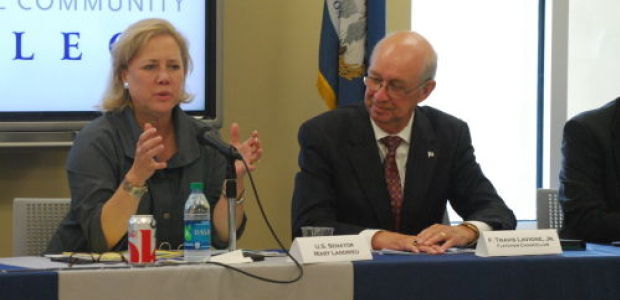CRIME BLOTTER: Reported offenses in the Tri-parish area
April 15, 2014Seminar aims to help boost sales
April 15, 2014Generating internship opportunities, industry-funded scholarships, high-school programs and professor endowments were among the ideas floated as ways to confront Louisiana’s workforce development crisis during a brainstorm session Friday.
U.S. Sen. Mary Landrieu hosted the roundtable discussion at Fletcher Technical Community College. Held roughly eight months after a similar idea session spurred federal legislation filed in both chambers of Congress, stakeholders posed raw, fundamental solutions as students highlighted some issues that are gumming their transition from school to the workforce.
“We really would like more industry to come in and offer students (internships),” said Jessica Courteaux, president of the Fletcher’s student government association and president of Future Leaders of the Oil and Gas Workforce. “If we have the experience, we’re able to go out and prove ourselves.”
Courteaux also asked companies to research scholarships for programs not covered by financial aid, thus opening education and training opportunities to a wider swath of prospective students.
The event was held at Fletcher’s newly minted $8 million BP Integrated Production Technologies building in Schriever, which boasts a unique laboratory to help train students for deep-water energy jobs.
Landrieu is the last Democrat to hold a statewide office in Louisiana, as the state’s senior senator. She is in the middle of a bitter, partisan campaign to maintain her seat with Congressman Bill Cassidy, R-Baton Rouge, seen as her toughest challenger.
Landrieu, who chairs the Senate’s energy and natural resources committee, has intensely focused on workforce development, holding similar events throughout the state. She has been pressed by Republican owners of corporations to expand the nation’s visa program to allow more immigrants to enter the country, building the potential workforce.
“I’ve made it one of my goals to give as many people in Louisiana a visa to the Middle Class as possible,” she said. “I’m happy to help other people get visas, but I really want to help the people I represent. I just don’t know what these choke points are. I can’t quite figure it out.”
The United States is amid an “energy and manufacturing renaissance,” of which south Louisiana is the “center of gravity,” and solving industry’s problem with increased training opportunities can provide an infusion to the maligned Middle Class, she said.
“I don’t want this window of opportunity to close before we’re able to push hundreds of thousands of people through to a better side, to a better place,” Landrieu said.
After the suggestion was made in a similar roundtable session at Fletcher, Landrieu proposed legislation to expand Pell Grants to include short-term job training. Rep. Cedric Richmond, D-New Orleans, filed an identical bill in the House of Representatives.
“A lot of the people that we’re looking to help train and move up are not 17-, 18-, 19- or 20-year olds,” Landrieu said. “They can be 40-year-olds with a family. They can’t take off two years to come to school … but maybe they can come for an eight-week evening program or maybe eight weeks on the weekend, get the training they need and, of course, move up.”
Landrieu said she may ask the top-50 energy companies to testify before her committee regarding solutions to workforce development. She also said workforce-development grants need to be steered to places with low unemployment rates – which indicates an area needs more workers – rather than regions with higher unemployment rates.
Lafourche Parish Government has taken a creative approach to chip in, parish administrator Archie Chaisson III said.
Like local jurisdictions throughout the country, Lafourche receives a Community Services Block Grant from the federal government to aid low-income residents. Traditionally, the bulk of those funds have been dedicated to paying utility bills – assistance that qualifying residents can receive for only one month out of the year. Lafourche has decided to place a more-restrictive cap on rental assistance or light-bill aid so that it can free up more CSBG dollars for tuition assistance, an idea the federal government approved in the parish’s action plan for the $213,000 received for 2013-15.
“We’re going to spend only a quarter on (living expenses) and put the other 75 percent toward workforce development, or something like that,” Chaisson said. “It will be a higher amount than what we’re using for assistance. We can hopefully wean people off of it and get more people into the workforce.”
But the issue extends beyond financial aid. Sometimes, for instance, the transition is made difficult by a lack of job-specific experience.
Christopher Jimison, a graduate of Fletcher’s integrated production technologies program and a production operator at Shell, said companies need to be open to apprenticeships so that aspiring employees close the gap from studying to practicing.
“The training that was provided here was essential,” said Jimison. “But there is a little bit of a gap between a student and actually having enough knowledge and experience to go offshore. … If there was one thing I could add, it would be some kind of fast track to a boot camp of some sort, even if it was three months, an internship. A company would have to have some incentive to take these students, because they’re going to (need) babysitters.”
U.S. Sen. Mary Landrieu addresses a roundtable of stakeholders at Fletcher Technical Community College’s BP Integrated Production Technologies building while Chancellor Travis Lavigne looks on. The idea session targeted remedies to the national shortage of skilled laborers that has intensified in Louisiana’s energy and manufacturing industries.











